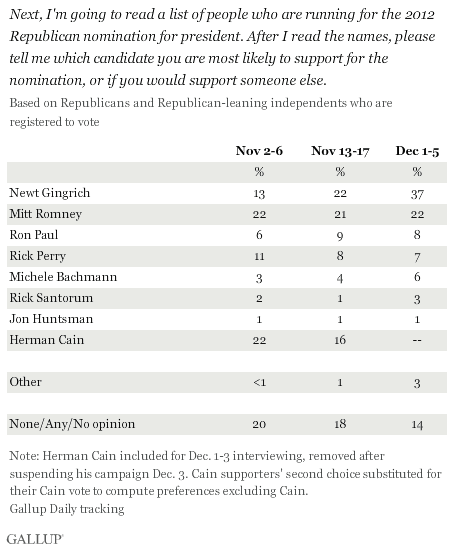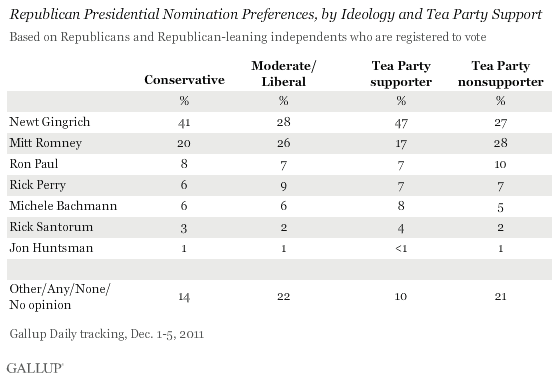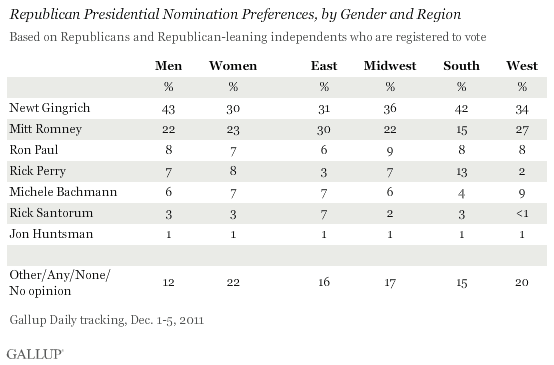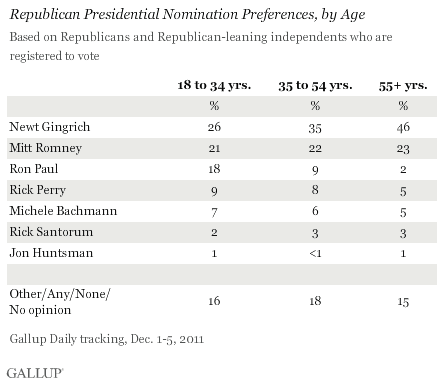PRINCETON, NJ -- Newt Gingrich leads Mitt Romney 37% to 22% in Gallup's inaugural Daily tracking of Republican registered voters' preferences for the 2012 GOP presidential nomination, with all other candidates in the single digits.

Gallup Daily tracking of the race for the GOP nomination began Dec. 1, and will be reported each day at 1 p.m. Eastern on the basis of a five-day rolling average of at least 1,000 Republicans and Republican-leaning independents who are registered to vote. The current results are based on 1,227 Republican registered voters nationwide interviewed Dec. 1-5.
This initial Daily report confirms that the Republican race has shifted once again, with former Speaker of the House Gingrich this time rising to the top of the GOP list. This is the latest in a series of front-runner changes that have marked the Republican nomination battle as one of the more volatile in the recent history of presidential politics. At various points since the field largely took its current shape in August when Rick Perry entered the race, Gallup polls have shown Perry, Cain, Romney, and now Gingrich as the leader or tied for the lead for the Republican nomination. Earlier this year and late last year, Gallup polls showed Mike Huckabee, Donald Trump, and Sarah Palin -- all of whom eventually declined to run -- leading or tied for the lead.
When Gallup last measured Republican registered voters' preferences Nov. 13-17, 22% supported Gingrich, 21% supported Romney, and 16% backed Cain.
Cain was included in the first three days of interviewing, Dec. 1-3, but his name was removed on Dec. 4 after he announced the suspension of his campaign. Cain's supporters from the first three days of interviewing have been re-allocated to their second-choice candidate. Cain was getting about 7% support prior to being removed from the survey.
Aside from the increase in Gingrich's support and decline in Cain's, there has been little change in support for the other candidates. Thus, it appears Gingrich has benefited most from Cain's campaign troubles in recent weeks.
Gingrich's support among all Republicans this year dropped to as low as 4% in August. Since then, his support has increased at least marginally in each Gallup poll, with the biggest increase in the current update. Gingrich's current 37% support is the highest Gallup has measured this year for any candidate, perhaps reflecting the narrowing of the field.
Gingrich Does Better Among Conservative Republicans and Tea Party Supporters
Gingrich's lead is especially large among conservative Republicans and those who describe themselves as supporters of the Tea Party movement, with more than twice the level of support of any other candidate. Romney ties Gingrich among Republicans who are not Tea Party supporters, and the race is close among moderate/liberal Republicans.

Gingrich is the leader among Midwestern Republicans and currently has a commanding lead among Republicans in the South. Romney is competitive with Gingrich among Republican voters in the East and West. Gingrich does better among men than among women.

Although Gingrich himself is not the oldest candidate in the field -- that distinction belongs to 76-year-old Ron Paul -- the former speaker's support is much higher among older Republicans, at 46% among those 55 and older. By contrast, 23% of those in this age category support Romney. Gingrich's support among middle-aged Republicans (aged 35 to 54) is 35%, and is 26% among younger Republicans (aged 18 to 34).

Implications
Former Speaker of the House Gingrich has mounted a strong comeback among Republicans nationwide after his nomination support dwindled to the low single digits this summer. This happened amid news reports about a large credit account at Tiffany's, his extended summer vacation on a cruise ship in the Mediterranean, and the abrupt departure of his campaign staff. Now, aided by solid debate performances and benefiting from the campaign troubles of Bachmann, Perry, and Cain, Gingrich has emerged as the leader for the GOP nomination nationally. His 37% support level is the highest of any candidate Gallup has measured all year.
The 2012 GOP nomination contest stands as one of the most topsy-turvy for the Republicans in the primary-nominating era. Not since 1964, when the nominations were still decided at the conventions, has Gallup seen more movement in nomination preferences. That year, Barry Goldwater emerged as the nominee at the national Republican convention after a year of shifting Republican preferences. Republicans more typically settle early in the contest on a dominant front-runner who ends up winning the nomination. The one exception to that pattern was in 2008, when eventual winner John McCain languished lower in national polls in November and December 2007 before emerging as the winner once actual voting began in January.
At this point, Gingrich's primary competitor is Romney, whose support level has generally held remarkably stable in the low 20% range all year, even as other candidates have risen and fallen around him. Gingrich's strength among Tea Party supporters and conservatives suggests that he may have a turnout advantage in early caucus and primary states if these groups display their usual disproportionate participation. Gingrich's strength in the South may also bode well for his positioning in the crucial early primary states of South Carolina and Florida, while Romney's Eastern strength plays to his advantage in New Hampshire.
Gallup Daily updates on Republicans' preferences for their party's nominee will continue until the nominee is decided.
Survey Methods
Results are based on telephone interviews conducted as part of Gallup Daily tracking Dec. 1-5, 2011, with a random sample of 1,227 Republicans and Republican-leaning independents, aged 18 and older, who are registered to vote, living in all 50 U.S. states and the District of Columbia.
For results based on the total sample of Republican registered voters, one can say with 95% confidence that the maximum margin of sampling error is ±3 percentage points.
Interviews are conducted with respondents on landline telephones and cellular phones, with interviews conducted in Spanish for respondents who are primarily Spanish-speaking. Each sample includes a minimum quota of 400 cell phone respondents and 600 landline respondents per 1,000 national adults, with additional minimum quotas among landline respondents by region. Landline telephone numbers are chosen at random among listed telephone numbers. Cell phone numbers are selected using random-digit-dial methods. Landline respondents are chosen at random within each household on the basis of which member had the most recent birthday.
Samples are weighted by gender, age, race, Hispanic ethnicity, education, region, adults in the household, and phone status (cell phone only/landline only/both, cell phone mostly, and having an unlisted landline number). Demographic weighting targets are based on the March 2010 Current Population Survey figures for the aged 18 and older non-institutionalized population living in U.S. telephone households. All reported margins of sampling error include the computed design effects for weighting and sample design.
In addition to sampling error, question wording and practical difficulties in conducting surveys can introduce error or bias into the findings of public opinion polls.
View methodology, full question results, and trend data.
For more details on Gallup's polling methodology, visit www.gallup.com.
